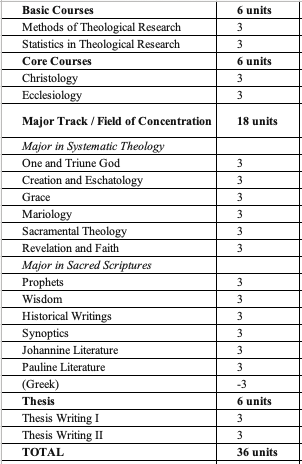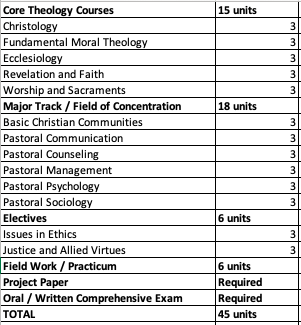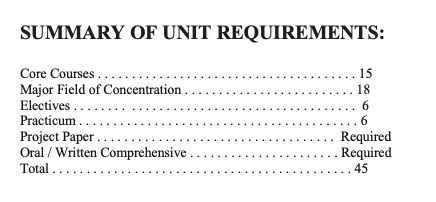INSTITUTIONAL THEOLOGY COURSE
St. John the Evangelist School of Theology (SJEST) offers a four-year Institutional Theology Course (ITC) to men who are aspire to become priests and have completed their philosophical studies. The general objective of SJEST is to prepare future minsters of the Church for the Archdiocese of Palo as well as other dioceses through a well-rounded formation program anchored on various areas of formation, namely human, spiritual, academic, and pastoral.
MASTER OF ARTS IN THEOLOGY (MAT)
St. John the Evangelist School of Theology, by virtue of Government Recognition (GR) No. 010, Series of 2002, issued by the Commission on Higher Education, now conducts an Academic Program leading to the Degree of Master of Arts in Theology (MAT).
RATIONALE
As an academic program, this course aims at fostering theological research and at promoting pastoral action in the area of encounter between faith and culture. This Academic Degree is meant for those going for the priesthood or for religious and laypersons who wish to undergo theological studies.
The specific objectives of the Graduate Program in Theology are:
- To develop skills and advanced study in the theological disciplines. i.e., Sacred Scriptures, Dogmatic Theology, and Moral Theology.
- To increase the teaching competence of those involved in the transmission of Christian Faith to specific groups of peoples.
The Graduate Program is basically open to all students who have been admitted to the St. John the Evangelist School of Theology, Palo, Leyte. They should have the following qualifications:
- A College Degree with at least 15 units in Philosophy or related subjects;
- At least 18 undergraduate units in theology or related subjects. Candidates who lack undergraduate units will be required to take correspondingly more graduate subjects for undergraduate credit;
- Must have an average of at least 85 (or B, or 2) in the baccalaureate course; however, students with a general average lower than the admission may initially be admitted on a probation basis upon recommendation of the admission committee and approval by the dean;
- Must bring the following documents upon enrollment: [1] Honorable Dismissal or Transfer Credentials from previous school; [2] Official Transcript of Records addressed to SJEST; [3] two passport-size (2X2) photos of oneself; [4] a Birth Certificate; and if a working student, [5] a letter of recommendation for the admission to the Graduate Program from the employer. For seminarian and religious, a letter of recommendation from the perspective ecclesiastical superior:
Definitive admission to the Graduate School will be given only after successful completion of 18 units.

Required courses vary per area of concentration. Candidates should consult with the Academic Dean with regards to some particular courses they are to enroll in.
A requirement for thesis writing is to take two (2) seminar courses, i.e., Seminar on Thesis Writing 1 and Seminar on Thesis Writing 2. Since Thesis Writing 2 will be completed with the successful defense of the thesis, these two courses, which are equivalent to six (6) units, shall be indicated only upon successful defense and submission of the finally approved thesis.
Comprehensive Examinations are given to the student (1) only upon passing all the required academic courses, and (2) if he has garnered a grade point average of 88% (or 1.7) or better. Topics for the examinations are taken from the Catechism of the Catholic Church.
All other rules and regulations indicated in the previous section regarding thesis writing and defense apply here. The following are specifically applied for candidates for MA in Theology.
Length and size: on bond paper size 81/2” X 11”, at least 120 pages, computer-printed, and can cover approximately 25 lines per page (footnotes included).
The panel of the defense is composed of four members, one of whom is either a representative from the Commission on Higher Education or any outside expert endorsed by the same office.
Copies: After a successful defense, the student submits five (5) copies of the revised form to the Office of the Academic Dean hardbound and bearing the signature of the members of the thesis committee, the members of the defense panel and that of the thesis adviser.
MASTER IN PASTORAL MINISTRY (MPM)
RATIONALE
This is professional graduate program meant mainly for students going for the priesthood. Although it could also be offered to religious sisters and lay leaders who aim to competently fulfill the pastoral tasks entrusted to them. It embraces a variety of disciplines in order to equip the student for the ministerial profession as priest and as administrator of any of the pastoral programs in the Diocese to which he/she will belong.
ELIGIBILITY AND ADMISSIONS
The Graduate Program is basically open to all seminarians who have been admitted to the St. John the Evangelist School of Theology, Palo, Leyte. They should have the following qualifications:
- A bachelor’s degree with Major in Philosophy, AB Classical (Major in Philosophy) or any other AB degree with at least 24 units in Philosophy;
- At least 18 undergraduate units in Theology or related subjects;
- Must have an average of at least 85% (or B, or 2) in the baccalaureate course;
Candidates must bring the following documents upon enrollment: [1] Honorable Dismissal or Transfer Credentials from previous school; [2] Official Transcript of Records addressed to SJEST; [3] two passport-size (2X2) photos of oneself; [4] a Birth Certificate; [5] a letter of recommendation from the respective ecclesiastical superior.
To get twelve (12) units practicum credit, a student will have to do a minimum of twenty-five (25) hours of actual pastoral work. This means, then, that two (2) units require fifty (50) hours of actual pastoral work. The required number of six (6) units would mean a total of one hundred and fifty (150) hours of practical work.
1.a) Practicum Credits would include:
- Faithful attendance at and completion of hours of actual work
- Close cooperation with the supervisor and pastoral director
- Two (2) Critical Incident Report
- Four (4) Theological Reflection
- Four (4) supervisory sessions with the pastoral director
- Submission of modules, lesson plans, log books, and / or other materials appropriate to the type of pastoral work engaged in.
1.b) Hours of Practical Work exclude:
- Travel to and from the place of work
- Non-work hours spent in the area
- Preparation for pastoral work
- Supervisory sessions
1.c) Hours of Practical Work include:
- Planning sessions
- Meetings in the areas
As a rule, the weekend apostolate for one semester is considered actual pastoral work. The department chairman of the pastoral ministry program together with the academic dean decides which concrete pastoral work (or apostolate) qualifies for practicum credits under the Master in Pastoral Ministry Program.
- There must be a definite and clear program in terms of objectives, strategies, support system and supervision
- Supervision is ensured. This implies and includes the following:
– A qualified field supervisor in the apostolate area
– A qualified pastoral director (who may be the main formator)
– A department chairman of pastoral ministry program who is part of the Dean’s Office.
PROJECT PAPER (Thesis equivalent)
Comprehensive examinations (written and oral) are given to the student 1) only upon passing the required academic courses, and 2) if he has garnered a grade point average of 88% (or 1.7). Topics for the examination are taken from the Catechism of the Catholic Church.





